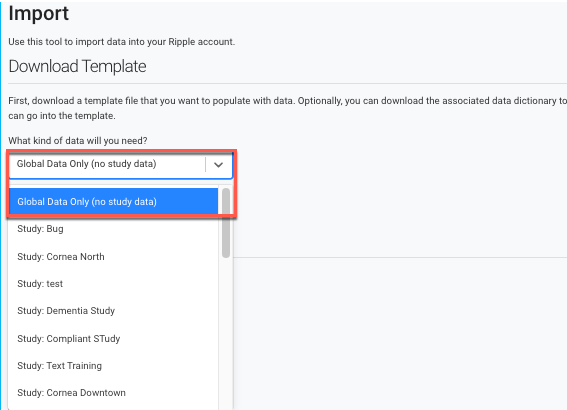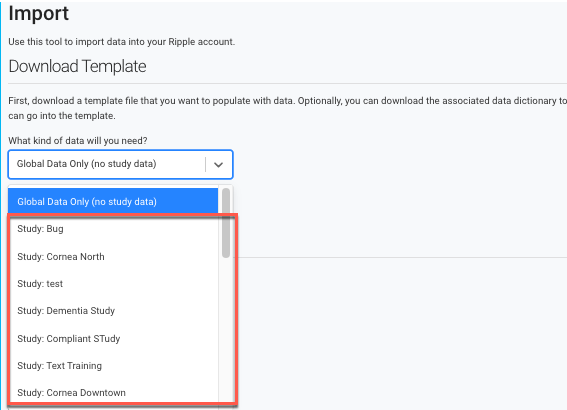Choosing What Kind of Data to Import
Importing Data in Ripple: Global vs. Study-Specific Data
Ripple allows users to upload two types of data: Global Data and Study-Specific Data. Understanding the difference ensures accurate data management across studies.
Global Data
Global data includes participant information that is not tied to a specific study. It remains consistent across all studies and is visible in the Global Registry.
Examples of Global Data:
- Participant Identifiers (e.g., name, date of birth, address)
- Global Custom Variables (marked as "global" during setup)
- Contact details
- Demographic information
Key Features:
✅ Follows participants across all studies they are enrolled in.
✅ Visible in the Global Registry for comprehensive participant tracking.
✅ Can be used across multiple studies without duplication.
Study-Specific Data
Study-specific data is unique to a particular study and does not transfer between studies or appear in the Global Registry.
Examples of Study-Specific Data:
- CustomID (unique participant identifier for a specific study)
- Event Dates (e.g., visit dates, follow-up schedules)
- Study Statuses (e.g., enrolled, withdrawn, completed)
- Recruitment Sources, Sites, and Strategies
Key Features:
✅ Restricted to a single study—data does not transfer between studies.
✅ Not visible in the Global Registry—only accessible within the assigned study.
✅ Customizable per study, allowing tailored data collection.
Choosing Between Global and Study-Specific Data
| Feature | Global Data | Study-Specific Data |
|---|---|---|
| Visible in Global Registry? | ✅ Yes | ❌ No |
| Follows Participants Across Studies? | ✅ Yes | ❌ No |
| Examples | Name, DOB, Address, Global Custom Variables | CustomID, Event Dates, Status, Recruitment Details |
| Customizable Per Study? | ❌ No | ✅ Yes |
By correctly designating Global vs. Study-Specific Data, Ripple users can efficiently manage participant information while maintaining data accuracy and study-specific integrity.
When Should I Upload Global Data?
Global data should be uploaded directly into the Registry when:
✅ You are importing a large database of participants who may later be assigned to different studies.
✅ You have participants not yet enrolled in a study but may be recruited in the future.
✅ You want participant information, such as names, contact details, and global custom variables, to be accessible across multiple studies.
Example Use Case:
- You have a database of 5,000 potential participants and want to add them to Ripple before assigning them to specific studies later.
- Uploading this list directly into the Registry ensures that they are available for future study recruitment without duplicating participant records.

When Should I Upload Study-Specific Data?
Study-specific data should be uploaded directly into a study when:
✅ You are importing participants directly into an active study.
✅ You need to include study-specific details such as:
-
- Recruitment source, site, or strategy
- Event data (e.g., visit dates, milestones)
- Study-specific participant identifiers (CustomID, statuses, etc.)
✅ You want participants to appear in the Registry, but their study-specific details will only be accessible within that study.
Example Use Case:
- You are conducting a clinical study and want to import participants with their study-specific recruitment source, assigned site, and enrollment status.
- Uploading directly into the study ensures their study-related details remain separate from general participant information in the Registry.

KEY CONSIDERATIONS:
- All study-imported participants will also be available in the Registry.
- Study-specific event data and custom variables (unless marked as global) will not be visible in the Registry.
- Still unsure? Contact Ripple’s support team for guidance on the best data migration strategy for your needs.
